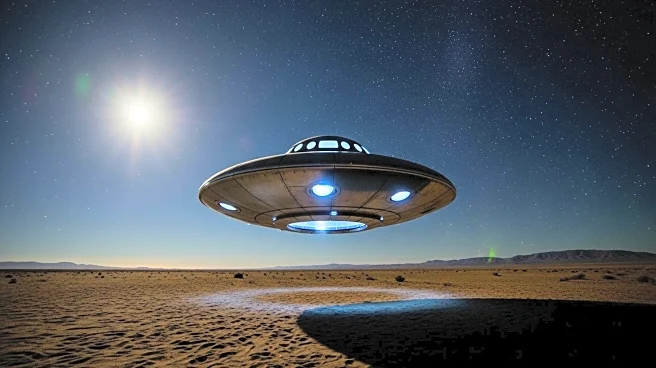What's Happening?
Colonel Kevin Randle, a former Vietnam helicopter pilot and Iraq intelligence officer, has shared insights into the 1947 Roswell incident, where UFOs were reportedly sighted. Randle, a UFO expert, explained that Roswell was significant due to its role in atomic research, being the site of the only atomic strike force at the time. Witnesses claimed to have seen extraterrestrial crafts and bodies, described as humanoid but smaller than humans, with larger heads and eyes. The debris field contained metallic material that could return to its original shape when bunched up. Randle's commentary highlights the ongoing interest in extraterrestrial phenomena and the historical context of Roswell as a focal point for such sightings.
Why It's Important?
The Roswell incident remains a pivotal moment in UFO lore, influencing public perception and scientific inquiry into extraterrestrial life. Randle's insights underscore the intersection of military history and UFO studies, suggesting that Roswell's atomic research significance may have attracted extraterrestrial attention. This narrative continues to fuel debates about the existence of UFOs and their implications for national security and scientific exploration. The incident has also shaped cultural narratives around UFOs, impacting media, entertainment, and public policy discussions on space exploration and defense strategies.
What's Next?
The ongoing interest in UFOs and extraterrestrial life is likely to persist, with potential implications for scientific research and government policy. As new technologies emerge, they may provide further opportunities to investigate and understand such phenomena. Public and governmental interest in UFOs could lead to increased funding for research and exploration, potentially uncovering new evidence or insights into extraterrestrial life. The Roswell incident may continue to serve as a case study for future investigations and discussions on the topic.
Beyond the Headlines
The Roswell incident raises ethical and philosophical questions about humanity's place in the universe and our readiness to encounter extraterrestrial life. It challenges scientific paradigms and encourages interdisciplinary research across fields such as astronomy, physics, and anthropology. The cultural impact of Roswell is evident in its influence on media and entertainment, shaping narratives around alien encounters and space exploration. This event also highlights the need for transparent communication between government agencies and the public regarding unexplained phenomena.











